4 Best Organic Mulches for Vegetable Gardens
-

- Last updated:
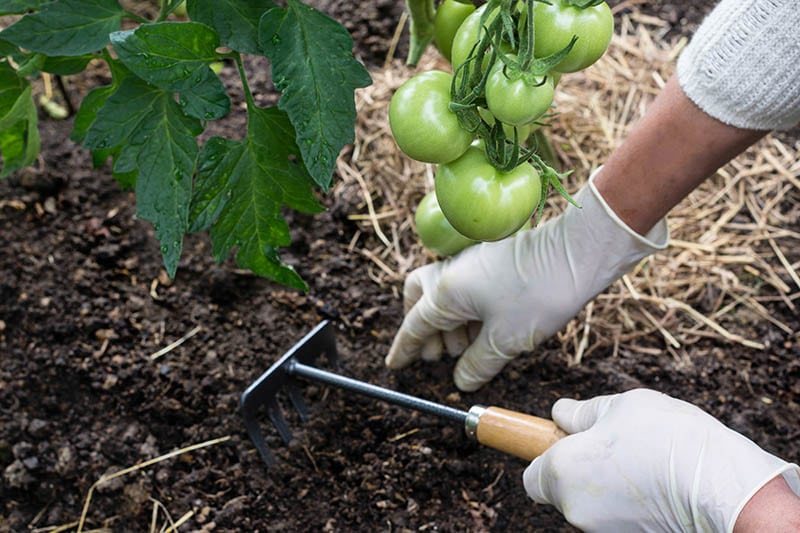
Successful home gardeners know the value of working smarter, not harder. With a diverse array of crops to manage, better planning equals healthier plants without expending extra time or resources.
Mulching is a crucial aspect of that planning, no matter what you’re growing. In the vegetable garden, organic mulches prevent weeds from germinating while feeding the soil and your crops. You’ll save on your water bill by keeping the ground moist and cool, and the soil structure will improve, helping your crops get the most nutrients from it.
Organic mulches come in various shapes and sizes and from numerous sources, but some are typically more efficient than others. Take the cost-effective route to grow healthier crops with the best organic mulches for vegetable gardens.
The 4 Best Organic Mulches for Vegetable Gardens
1. Straw
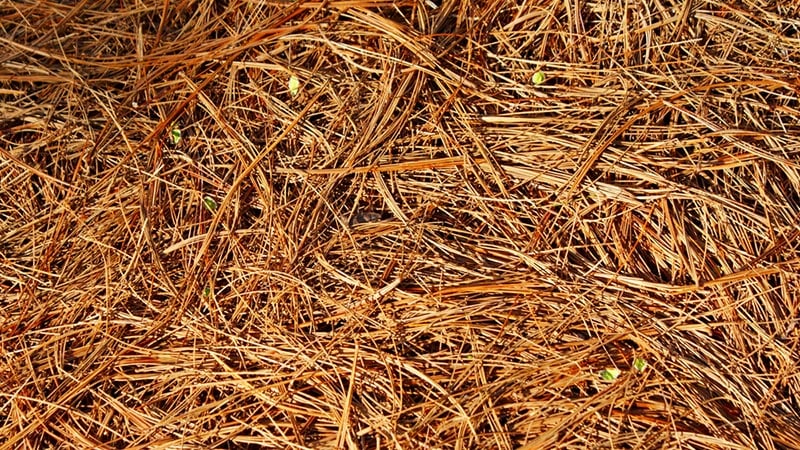
| Layer Thickness: | 3–4 inches |
| Decomposition Rate: | 1–2 years |
Straw is less likely than hay to contain weed seeds that could wreak havoc in the vegetable garden. It is inexpensive and lightweight and composts quickly to feed your plants. As a carbon-rich material, the straw will make the soil more friable, giving it the perfect drainage level and room for roots to flourish.
Use straw on footpaths between rows and between plants in beds. Wheat straw is one of the most readily available, but rice straw, like MIGHTY109 rice straw mulch, is far less likely to have seeds. It’s always best to use straw that hasn’t had pesticide or insecticide treatments that may hurt your veggies.
As an attractive nesting material, straw isn’t always ideal if you have rodents in the area. It’s crucial to layer it several inches thick because it will quickly go airborne from wind gusts. Keep an eye on it about a month or two after mulching, and add another 2–3 inches if weeds start to show through or the summer weather starts to heat up. Leave straw mulch through the winter to promote beneficial microbe health and prevent erosion.
2. Pine Needles
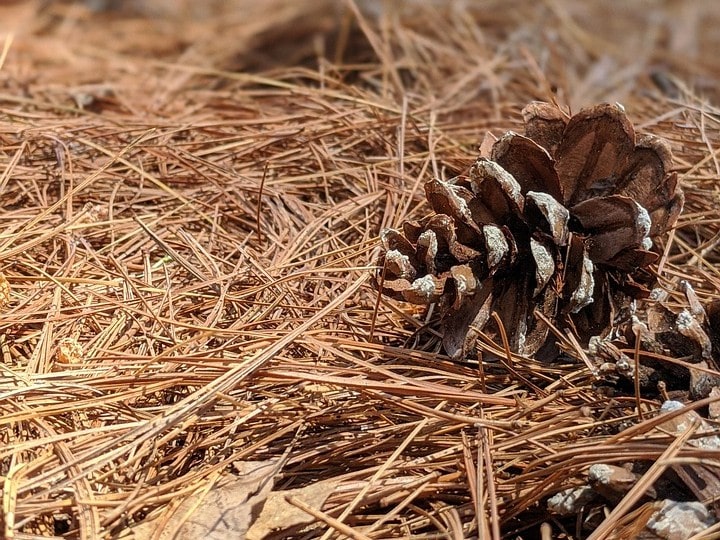
| Layer Thickness: | 3–4 inches |
| Decomposition Rate: | 2–4 years |
Pine needles are less likely to blow away than straw, and they’re no less accessible and cheap. Mulch pine needles around the yard, or purchase cost-effective bundles, like those from USA Pine Straw. It looks tidy around garden plants and doesn’t carry the same threat of seediness as straw. Be wary if you live in a fire-prone area because, like straw, pine needles can also be highly flammable.
It’s commonly thought that pine needles will acidify the soil, making them only suitable for acid-loving plants like tomatoes, radishes, and carrots. In truth, the acidic pine needles don’t appreciably lower pH, meaning you can take advantage of their moisture-retaining and soil-improving qualities with most garden vegetables.
3. Compost
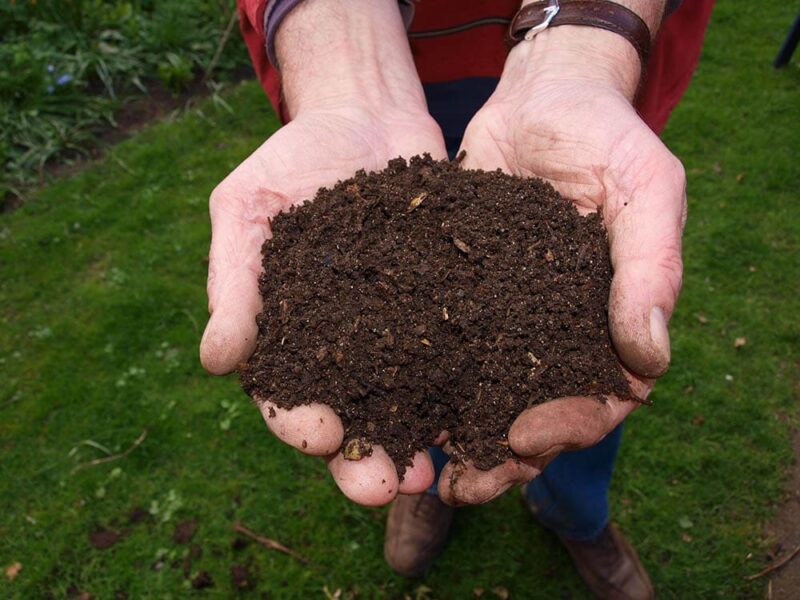
| Layer Thickness: | 1–4 inches |
| Decomposition Rate: | 1–12 months |
Compost works best as a supplemental layer to another organic mulch for the vegetable garden because it can allow weeds to thrive. Add a straw, pine needles, or another vegetable garden organic mulch to keep weeds down, letting the compost release nutrients and develop the ideal soil texture to help your plants and beneficial microbes.
You can make a DIY compost heap or skip the wait and the work by getting a ready-made organic compost like Charlie’s Compost. Compost breaks down fast, so you’ll likely have to make additional applications throughout the growing season.
4. Cocoa Hulls
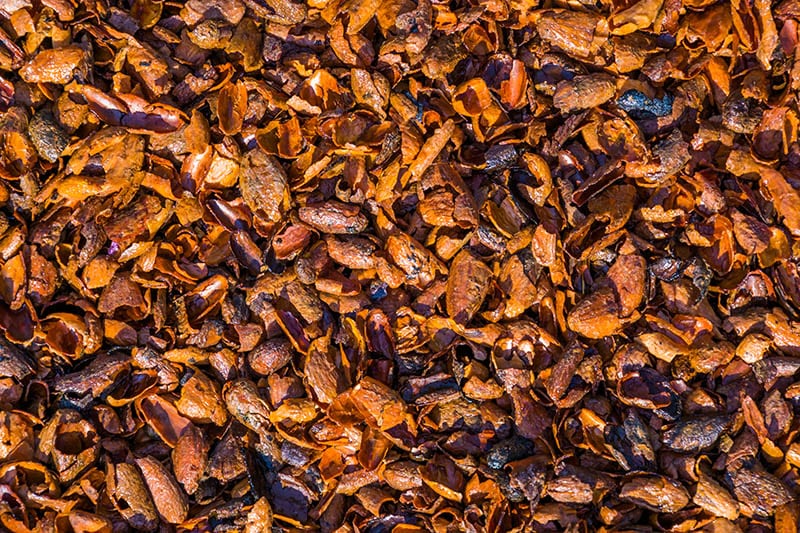
| Layer Thickness: | 1–2 inches |
| Decomposition Rate: | 1–2 years |
Cocoa hulls are one of the most expensive organic mulches for the vegetable garden, but they have a lot to offer in aesthetics and protection. The mulch, available from companies such as Hull Farm, looks lovely atop the beds as it adds nutrients to the soil, blocks weed growth, and keeps moisture in. After mulching, you’ll also enjoy a pleasant cocoa aroma around the garden for the next few weeks.
You may want to avoid cocoa hulls if you have dogs near the garden, as the mulch might contain toxic levels of caffeine or theobromine. Cotton and buckwheat hulls make viable alternatives if you want the same benefits without the dangers of cocoa hulls.
Tips for Using Organic Mulch
Add organic mulch around your garden vegetables without letting them touch, as you could cause fungal diseases to pass to your plants. After the application, gently water the mulch to let it settle and hold it together. Doing so will be especially helpful to mulches like cocoa hulls, as the water allows the pieces to bind and keeps them from blowing away. Always pull weeds and amend the soil before you mulch to prevent issues from arising underneath it.
When to Mulch
It’s best to apply organic mulch in the mid to late spring after the soil has a chance to warm. Mulching too early can keep the temperature down, making it harder for vegetables to germinate. Soil temperature should be around 50–60 degrees F for cool-season crops and 65 degrees for warm-season plants. In the fall and winter, light mulching after the ground freezes can reduce cold stress on your plant.
Mulch Depth
When mulching in the spring, ensure you’re mulching deep enough to cover weeds and prevent sunlight from reaching them. You’ll typically want to use thicker layers for larger media. Straw mulch layers, for instance, should be deeper than grass clippings. Avoid layering too thick because it could suffocate roots and become appealing to pests seeking shelter.
Final Thoughts
Mulch is too beneficial to leave out of your veggie garden, and with your garden’s need for nutrients, organic options have clear advantages when promoting healthy vegetables. But while most organic mulches will help your vegetable garden, some will provide superior protection and enhance your crops from the offset. Start with these four organic mulches, and you’ll see notable differences in the quality of your harvest.
Featured Image Credit: Jurga Jot, Shutterstock
Contents

